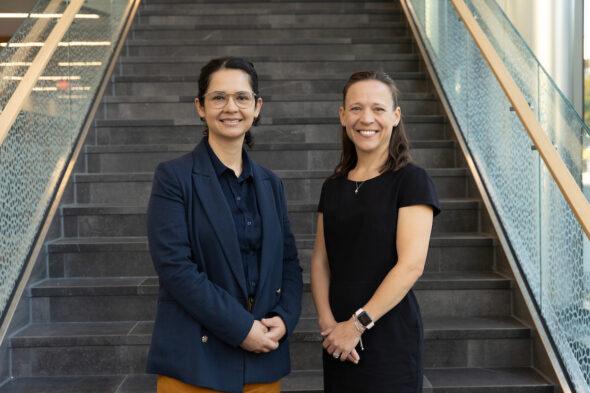UIC chosen among 6 study sites for national ‘multi-omics’ research consortium
The University of Illinois Chicago will play a key role in a new National Institutes of Health initiative to transform genetic, environmental and clinical data into novel opportunities for diagnosis, treatment and prevention of complex disease.
UIC will serve as one of six study sites in the new $50 million Multi-Omics for Health and Disease Consortium, recently announced by the NIH in September. The UIC site will focus on developing and applying new molecular technologies and data science strategies to understand the cellular changes linking adverse environmental exposures to diabetes and chronic kidney disease, following a cohort of 300 racially and ethnically diverse patients.

The UIC group, led by Tanika Kelly and Dr. Ana Ricardo of the Division of Nephrology in the College of Medicine with Maria Argos of Boston University, will look for novel molecular mechanisms responsible for the initiation of kidney disease in patients with diabetes and the progression of this condition to end-stage disease.
“There are over 30 million adults with diabetes in the United States, but not every one of them develops kidney disease,” said Dr. Ricardo, professor of medicine at UIC. “So, we want to know, of these patients with diabetes, which are going to develop kidney disease and why and how can we prevent that?”
Since the completion of the Human Genome Project in 2003, scientists have had expanded opportunities to interrogate DNA for genetic variants related to health and disease. Further advances in next generation sequencing technology and mass spectrometry have allowed assessments of additional biological systems, including RNA (the transcriptome), proteins (the proteome), and low-molecular weight chemicals (the metabolome), in large human samples. These advances also have helped researchers begin exploring the influence of external factors, such as environmental exposures (the exposome) and social determinants of health (the sociome), on the biological processes that lead to disease.
Multi-omics seeks to combine all these dimensions — the multiple “omes” — to form a broad and deep understanding of how genes and the environment interact and influence disease susceptibility or severity. While new technologies have made it easier to collect data across these different systems, combining this information and extracting actionable knowledge remains a major scientific challenge.
As part of the consortium, UIC researchers will coordinate with the National Human Genome Research Institute and other partners on creating universal approaches for multi-omics data collection and analysis.
“Multi-omics really gives us the opportunity to understand how the genome interacts with all of these environmental factors to influence health status,” said Kelly, professor of nephrology at UIC. “This consortium will allow us to develop integrative systems biology methods to better handle all of this data that everyone is generating in the context of complex diseases.”
As a study site, UIC researchers will recruit 300 patients — 100 with diabetes, 100 with diabetes and kidney disease and 100 healthy patients —with an emphasis on underserved populations that experience higher rates of both diseases. Researchers will analyze blood and urine samples from these patients over time to collect data on genetic variants, gene expression, exposure to environmental toxins and other “omics” areas, combining it with clinical observations about their health and disease progression.
The new study also will overlap with the ongoing Kidney Precision Medicine project at UIC, which has collected kidney biopsy samples from patients that can provide additional biological information. The goal is to build a molecular profile for each patient that contains information about their risk for developing kidney disease or warning signs that their disease is progressing to a more severe stage.
“Right now, we have equations and formulas that help us estimate the risk of someone with kidney disease to progress into developing chronic kidney failure and require dialysis or a transplant. But those tools are far from perfect,” Ricardo said. “I would like to have a simple test or biomarker via the blood or urine or saliva that can tell me with more precision which patient is going to be more likely to develop kidney failure.”
Cellular multi-omics and clinical data will be combined with data on trace metal and environmental toxicant exposures, as well as surveys and census information on social conditions, such as food security, discrimination and neighborhood characteristics. By working with the diverse patient population of UI Health, the study site can examine the causes of existing health disparities while working to ensure that the clinical innovations of multi-omics approaches benefit all communities.
“We have so many patients from underrepresented communities facing higher burdens of biological stress that may result from exposure to metals, other environmental toxicants and adverse social determinants of health,” Kelly said. “The population here is unique and unfortunately underrepresented in research, so I think it’s a great opportunity to try to really understand how these exposures can influence our bodies and health in general, with an eye towards precision disease prevention and treatment.”


